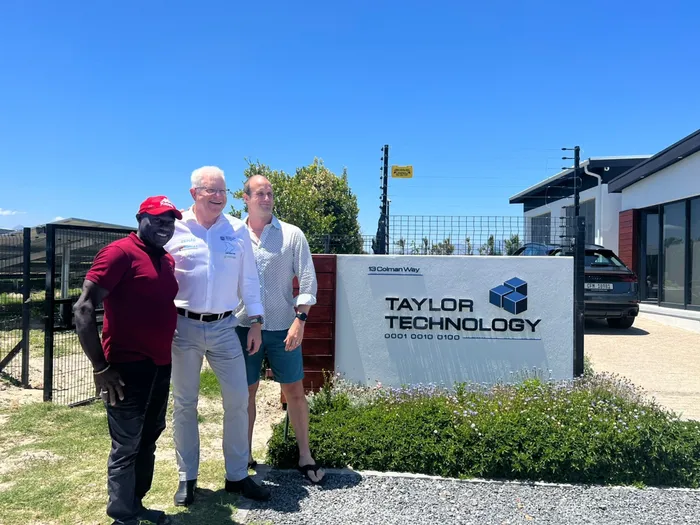Provincial government studies new energy-savvy methods that keep businesses afloat during load shedding

Pictured during the site visit to Taylor Technology are from left: Eugene Ndoungou, site and electrical manager, Western Cape Premier Alan Winde and managing director, Andrew Taylor. Picture: Supplied
Cape Town - Determined to save jobs and play a part in creating an energy resilient city, Taylor Technology in Macassar shifted to a solar powered workspace and invested millions of rands in the new system.
The business operates a data centre that houses supercomputers that play a vital role in securing the bitcoin network.
Managing director Andrew Taylor said that although they had endured the financial effects of load shedding, investing millions in new energy methods had been fruitful. The establishment reportedly invested millions in new energy sources to secure permanent jobs and those of a number of contractors who help render its services with no disruptions, and have been exploring more ways to be energy savvy.
It uses generators and has installed 280 solar panels. It has also implemented various strategies such as open-air cooling, maintaining air filters, and using evaporative cooling pads instead of energy-intensive air conditioning.

"Load shedding had increased our direct costs by 30%, given our diesel generator is more than three times more expensive than grid electricity. Cheap and reliable energy is what makes a country flourish and helps to move people out of poverty.
“In addition to our data centre, our premises also include an organic vegetable and water-wise garden that provides food for the people and families that work for us.
"We will forever remain committed to long-term success and are grateful to Larry Fitnum from Energy Capital and Alan Wilde from the Western Cape government for their help in completing our solar installation project," Taylor said.
He was speaking in response to Western Cape Premier Alan Winde's visit to their premises earlier this week.
According to a statement, Winde's intention was to explore the private sector’s energy resilience methods that have successfully managed to save jobs and keep businesses afloat under the scourge of load shedding.
Winde said making the Western Cape more energy resilient remains a top priority for the provincial government in 2023, saying that government would be working closely with the private sector and municipalities across the province to create an enabling environment for energy resilience.
“I applaud our partners in the private sector for taking chances by setting up their business operations in our province, bringing with them economic and job opportunities, and for helping in our collective drive to become more energy resilient," said Winde in a statement.
“We need to make sure there is more investment into and from the private sector to mitigate the devastating effects of load shedding. In 2022 we had 3 630 hours cumulative hours of load shedding in South Africa. Economic recovery, and more importantly, job creation, cannot happen under these circumstances.
“2022 was a year of recovery for the province. In 2023 we will push harder to further our economic recovery amid the ongoing energy crisis. The very successful festive season concluded the Western Cape’s year of recovery. But now at the beginning of 2023 we know that it will be a challenging year, but it is nonetheless a year of hope and opportunity for the Western Cape,” he concluded.